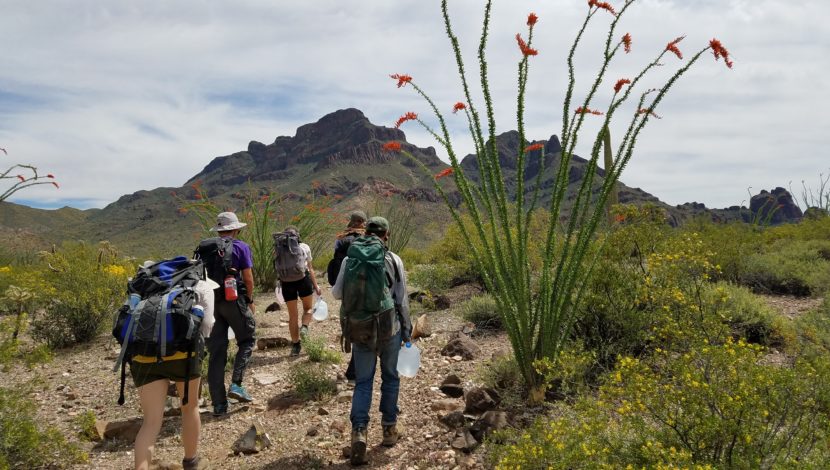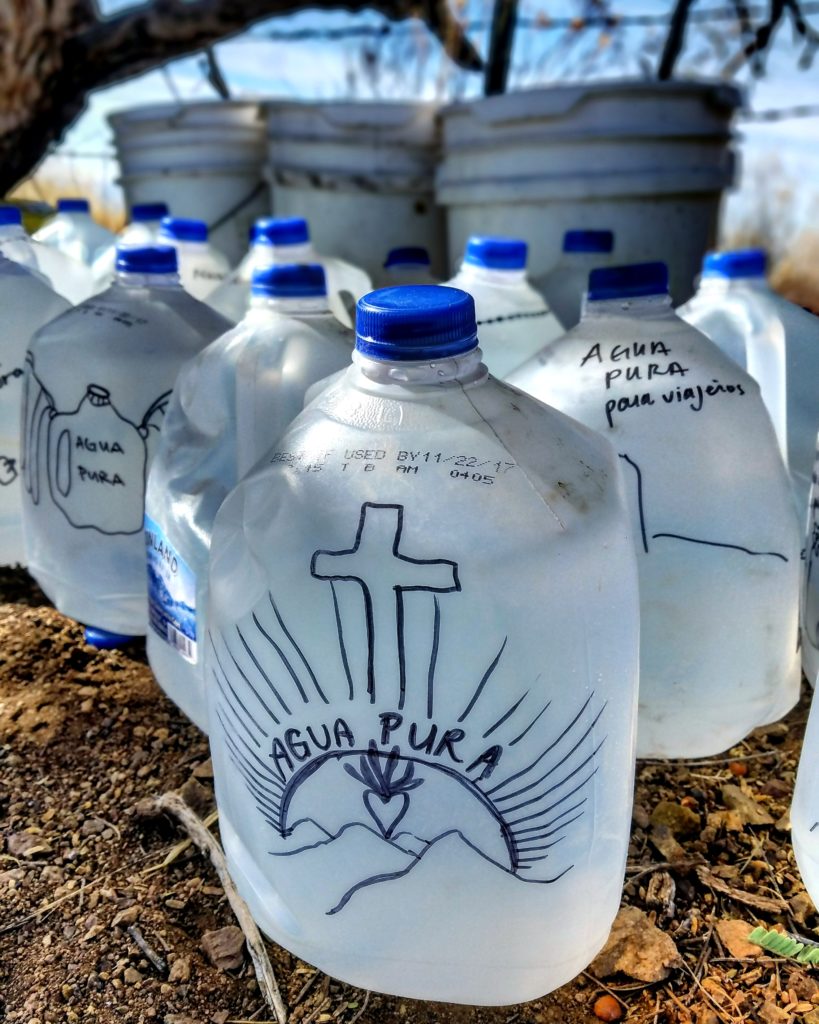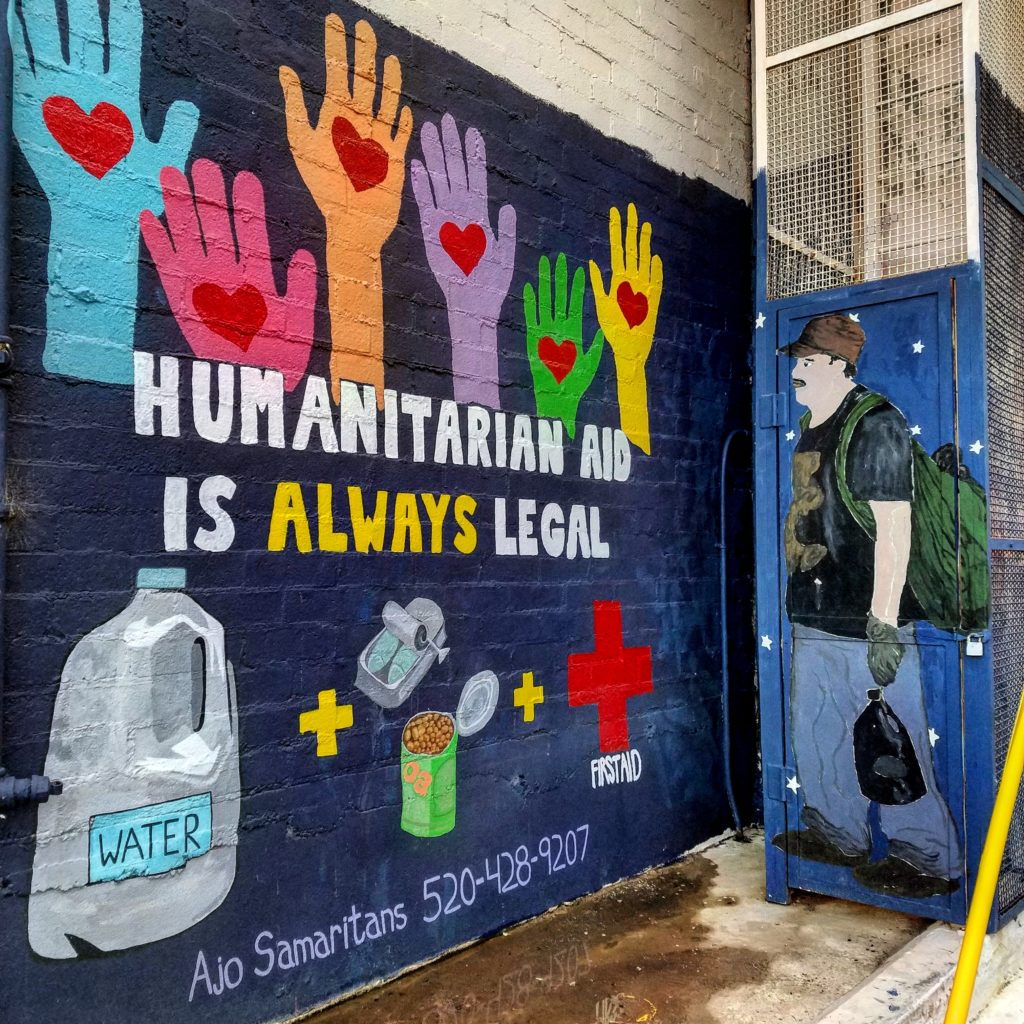The Unitarian Universalist Service Committee advances human rights through grassroots collaborations.

By on July 30, 2018
Near the U.S.-Mexico border, No More Deaths (NMD) volunteers carry gallons of water into remote areas of the Sonoran desert, where dozens of people die every year in their attempt to walk across the border. For as many bodies that are recovered in the desert, estimates are that up to three times that number of people go missing and are never found. This January, NMD, a UUSC partner, released a report documenting how U.S. Customs and Border Protection (CBP) officers routinely destroy their water and supply drops. Authorities responded swiftly, arresting a NMD volunteer that same day and charging him with “harboring illegal aliens,” a federal felony. Several other NMD volunteers were also charged with criminal offenses for leaving water in the desert.

At midnight in Croatia, an Afghani family is caught in a snowstorm after crossing the border from Serbia. They send a message to Are You Syrious (AYS), a Croatian volunteer organization helping refugees and UUSC partner. They are traveling in a group of 14 people, including 11 children. It is their fourth time seeking asylum in Croatia after being illegally pushed back three times before. In a previous pushback, their six-year-old daughter, Madina Hussiny, was killed in a train collision after Croatian officers directed them to follow the tracks back to Serbia. AYS volunteers immediately inform the police and send a volunteer to the closest police station to meet the Hussiny family. The volunteer, through direct contact with the police, helps the family initiate the asylum procedure under Croatian law. The volunteer is then notified that he will be charged with assisting in the illegal crossing of a border.
In Budapest, Hungary, it is the beginning of summer. A group of lawyers, aid workers, and activists in matching t-shirts inflate a giant red heart-shaped balloon in the sunshine outside the majestic parliament building on the Danube. The festive scene contrasts with their urgent demands to stop plans to criminalize aid to asylum-seekers. A few days later, the National Parliament marks World Refugee Day by passing a law that could send some of those people to jail and shut their organizations down.
There was a time when such acts – leaving water for people dying of thirst, helping asylum-seekers through the legal process – would be celebrated as good, compassionate work. Why are they being criminalized?
The roots of criminalization
In May, I was part of a group of UUSC staff and donors who visited our partners helping refugees along the Balkans route to Western Europe. In Zagreb, Belgrade, and Budapest, activists told us stories about the outpouring of support for the first large waves of refugees traversing the Balkans to seek refuge in Western Europe. “It was really nice…we were seeing lots of volunteers going out to the streets and helping people on the move,” said Aniko Bakonyi, from the Hungarian Helsinki Committee (HHC), Hungary’s leading human rights organization.
Our partner Centre for Peace Studies, one of the most well-established civil society organizations (CSOs) in Croatia, documented this community spirit with a series of moving short films showing Croatians helping refugees. The slogan: There is no them and us. We’re all people. However, once the Balkans route “closed,” refugees were viewed with suspicion, CSO staff were no longer invited for televised interviews on the issue, and government officials began accusing them of helping migrants secretly cross the border into Croatia. The Croatian Ministry of the Interior is continuing to pursue charges against the AYS volunteer who assisted the Hussiny family, seeking a punishment of three months in prison, a penalty of 45,000 euros, and an order prohibiting him from working in Croatia.
In Hungary, the government’s actions are even more extreme. Prime Minister Viktor Orban’s xenophobic campaigns against asylum-seekers and refugees were intertwined with concerted attacks against CSOs seeking to help them – the same organizations who happen to also scrutinize his efforts to roll back democratic checks and balances.
On June 20, 2018, World Refugee Day, the Hungarian Parliament passed a law that criminalizes the act of providing information on how to seek asylum to people who are not eligible for asylum. In doing so, it ignores the fact that the asylum procedure is what determines eligibility for asylum. Instead, it demands that CSOs preemptively identify whose asylum claims might be successful and bear the risk of jail if they are wrong.
Marta Pardavi, co-chair of HHC, said of the new law:
“Seeking asylum is not a crime. Providing legal assistance to asylum-seekers is not a crime either. Everyone has the right to be informed about the law and to know what to expect during legal procedures.”
In the United States, a policy called Prevention through Deterrence (PTD) was put into place in 1994. PTD emphasized cutting off traditional crossing routes through urban centers, thereby forcing those who wanted to cross the border to make the journey through remote desert regions. In The Land of Open Graves – Living and Dying on the Migrant Trail, anthropologist Jason De Leon described the show of force required by this decision, which pushed migrants into more rural and dangerous terrain. A 2010 Congressional report explained:
“‘Prevention Through Deterrence’ . . . has pushed unauthorized migration away from population centers and funneled it into more remote and hazardous border regions. This policy has had the unintended consequence of increasing the number of fatalities along the border, as unauthorized migrants attempt to cross over the inhospitable Arizona desert without adequate supplies of water.”
The question is now whether we can consider this consequence “unintended,” as those who try to leave “adequate supplies of water” in the desert are now prosecuted for their actions.
Deterrence and vilification tactics
Sometimes deterrence measures rely on a lack of hope, the danger of the journey, or even family separation, as we’ve recently seen in the United States. Yet, the United States is not the only state using deterrence as a mechanism to manage asylum. Countries across the globe want fewer people to come to their territory and apply for asylum and are using the desert, fences, laws, and bureaucracy to stop them. Work that lessens the danger of the journey or helps people navigate the legal procedure is seen as undermining this endeavor and therefore criminalized. Little thought is given to the logical endpoint of trying to “deter” people fleeing persecution. In response to Hungary’s June 20 passage of the law aiming to criminalize those who help asylum seekers, Pardavi said, “the Hungarian Government, instead of protecting refugees from persecution, has chosen to join the ranks of the persecutors.”
Vilification also plays a role. Orban has falsely stated that “every single migrant poses a public security and terror risk.” President Trump recently tweeted that “we should be changing our laws, building the Wall, hire Border Agents and Ice and not let people come into our country based on the legal phrase they are told to say as their password,” and has decried migrants as rapists and gang members.

Once migrants and asylum-seekers are vilified, it becomes easier to limit their legal options and subject them to harm. And, it doesn’t stop there – it also extends to those who help them, criminalizing actions that we once thought of as critical to our shared humanity: Giving water to people dying of thirst.
Earlier this month, UUSC and HHC released a joint report highlighting the disturbing parallels between Hungary and the U.S. when it comes to dismantling asylum. It’s worth a read and provides salient points on how dangerously close we are to completely shutting our borders.
Photos by Carrot Quinn
Read This Next
What Hungary’s “Cautionary Tale” Can Offer the United States
A new report from UUSC examines how the United States is quickly following Hungary down the path to dismantle asylum. Read More →
